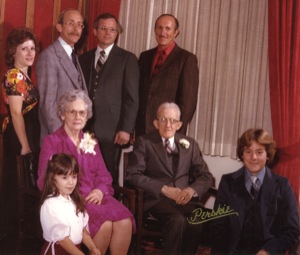
“Put your hands on the bar” was the familiar order of the San Diego Vice Squad during the ‘70s. Homosexuality and engaging in sex with someone of the same sex was a criminal offense except “in private;” and then the definition of “in private” was subjective on the part of the arresting officer. Behind closed doors was defined as a closed room in a closed larger room, so police officers regularly trolled the “members only” clubs for gay men holding hands, dancing or exhibiting any type of affectionate behavior. The way we were in the ’70s can best be described as in the closet, afraid and oppressed as a secret minority. Unlike ethnic minorities, gay/lesbian people are not visibly or self-identified as gay, so protesting against the oppression required a great deal of courage; and simply meeting a friend for socializing in a “private club” could jeopardize your job and your safety. Someone once said that “oppression can only survive through silence.” As the oppression increased a few voices spoke out, and over the decade of the ‘70s in San Diego the LGBT community found its voice and put their feet on the street in protest, to bring about several significant changes in city policy and the state laws. Public awareness, political involvement and a lot of protesting in the street moved, using morality as a guide to adult sexual laws, to a focus on the consent of the parties involved and the privacy of the location.
One of the first quiet voices to step out was Lou Arko, a straight businessman who purchased the Brass Rail restaurant and bar in 1958, in downtown San Diego. The city ordinances at the time prohibited gays from being licensed to own clubs or bars. The Brass Rail had a piano bar at night where gay men socialized and met, and although San Diego Vice Squad officers regularly visited the Brass Rail, ordering everyone to “put your hands on the bar,” Lou Arko maintained and encouraged his gay clientele and subsequently opened numerous other gay friendly bars and businesses. Lou and Carol Arko gave the LBGT community a place to socialize and a place to be, at great expense and risk to their own wellbeing.
Ten years later in 1968, Clint Johnson opened the Show Biz Supper Club in Hillcrest which was the first female impersonator show in San Diego. Tourists were bussed in from Mission Valley to see the three nightly shows. In 1970, members of the LGBT community began to establish businesses and residences in the Hillcrest area, and Clint Johnson and Lou and Carol Arko played major roles in helping build a community of businesses and organizations that the LGBT community could call home.
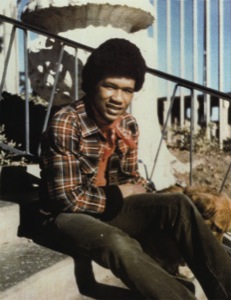
Other leaders began to emerge in the growing community as some bars refused to allow cross dressers in their premises. In 1972, Nicole Murray Ramirez organized a successful boycott of those bars and they soon relented. In the meantime, police continued to conduct nightly raids on the “membership only” private clubs that were established to allow gay men to meet, dance and use private rooms for more intimate behavior. Vice officers joined the clubs, and in some cases actually engaged in sex before arresting the club members. The definition of “in private” was the operative phrase of the day.
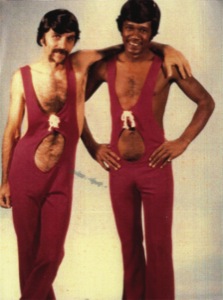
In 1974, a group of gays applied for a permit to hold a parade/march downtown and they were denied the permit. Over 200 people showed up in the summer of that year to march downtown, as a protest against the lack of human rights as a result of city officials not allowing the LGBT community to express their pride. Many of the participants marched with bags over their heads so as not to be recognized. Today, over 100,000 people participate in watching and enjoying the San Diego Gay Pride parade. Some of voices that stepped forward to protest and lead that first march were Nicole Murray Ramirez, Al Best and Jess Jessop. The city officials issued a permit the next year and now thousands of people participate and hundreds of thousands enjoy the two and a half hour long parade.
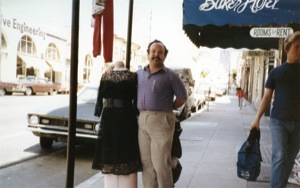
In that same year the Teddy Roosevelt Republican Club was founded by Nicole Murray Ramirez for the purpose of creating a lesbian gay political action committee. In 1975, The San Diego Democratic Club was founded by Bob Lynn for gay/lesbian political action. In 1976 Gay Activists of San Diego (GASD) was founded to defend the right of every person to equal protection under the law, regardless of sexual orientation or preference.
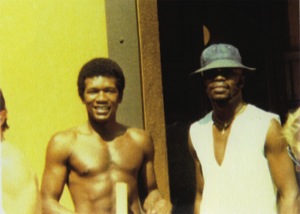
The year 1979 was a benchmark one, as The Update publication was launched by Don Hauck, largely as a response to a recent raid on the Fourth Avenue Club, where 23 patrons were arrested on a variety of charges. The subsequent founding of the Gay Alliance for Equal Rights took place in response to the increased harassment of gays by the San Diego Police Department. Later on in 1985, a Gay/Lesbian Police Liaison Committee was founded by Susan Jester, president of the Log Cabin Club to improve relationships and communication between the community and the department.
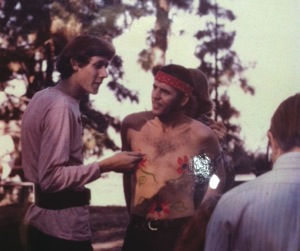
By the end of the year in 1979, several events had taken place to improve human and equal rights for the LGBT community. An assemblyman from San Francisco, Art Agnos, introduced AB-1 in the Sacramento legislature; a measure to ban discrimination in employment based on sexual preference statewide. Agnos was quoted in The Update challenging the LGBT community to “get involved on their own behalf. They have to become candidates themselves, for the city councils, for the state legislatures, for the Congress. They have to come out of their closets. I think they have to come out and tell our society who they really are. It’s important for gay people to get involved in the visible part of our political system; the longer discrimination goes, the less free people are.”
The publicity around this legislation raised public awareness about the injustices experienced in the gay/lesbian community. That same year, Gov. Pat Brown signed an executive order preventing discrimination against individuals based on sexual orientation. The first March on Washington took place that same year and Al Best, Jess Jessop and Nicole Murray Ramirez again organized a large contingent to participate and activate the larger gay/lesbian community. 1979 also saw Al Best, the first openly gay man to run for public office in San Diego.
The early years taught our community to speak up, come out, organize, get involved in politics and never give up. The challenges ahead will require the same commitment and leaders who are willing to put themselves out there. We have come a long way, and we are not the way we were. We no longer have to “put our hands on the bar,” but there will always be haters and there will always be those individuals who believe the LGBT community has no right to exist. While in 2011 it’s chic to be LGBT, until there is marriage equality for all and LGBT teenagers can feel safe in school and online we must keep our voices strong and keep our feet on the street and in Congress. “Our lives begin to end the day we become silent about things that matter.” Martin Luther King, Jr.










